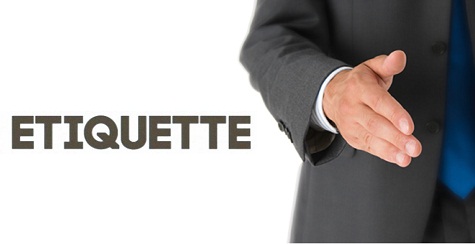Categories
- Assertiveness
- Business Etiquettes
- Business Writing
- Change Management
- Communication Skills
- Corporate Dressing
- Conflict Management
- Cross Cultural Training
- Customer Service
- E Mail Writing
- Employee Etiquette
- Power Point Presentations
- Emotional Intelligence
- Leadership Skills
- Motivation
- Negotiation Skills
- Presentation Skills
- Problem Solving
- Public Speaking
- Resume Writing
- Sales Training
- Stress Management
- Telephone Etiquettes
- Time Management
Spoken & Written English
Call Center Training

Business Etiquette: Move Forward with Good Manners
What never goes out of style are etiquette and refined manners. To put it simply, etiquette tells us which fork to use, while manners tell us how to behave when our neighbor uses the wrong one. Business etiquette is needed today more than ever. We can get caught up with the busy-ness of our day-to-day work that it's easy to neglect common decency.
What is Business Etiquette?
Business etiquette is composed of generally accepted codes of behavior based on custom or norms. Collectively they act as social guidelines and manners deemed appropriate to be followed in professional settings.
Why is it important?
Etiquette in professional setting is essential because it promotes civility, relationship-building and customer service. How we conduct ourselves is what makes a lasting impression.
The Basics
Punctuality
Individuals who have the habit and reputation for punctuality tend to be viewed more favorably by colleagues, clients and friends.
Professional Handshake
When you meet a new person or greet an associate in a business meeting, it is advisable to extend your hand and offer a firm handshake.
Language
Avoid using profanity, swearing, telling off-color jokes of any type and discussing taboo or inappropriate topics (gossip, salaries, sex life, affairs, criminal activities, etc.). Think before you speak.
Attire/Dress code
Always practice impeccable grooming (even in a jeans environment). Dress in a manner appropriate for your company, position, & activities at all times. People are likely to form a positive impression about your abilities and the professionalism of the organization you represent.
Meetings
Beforehand, communicate the following: Agenda & Duration. Start on time. Avoid texting or accepting calls. Let's not lose sight of the fact that the person in front of you deserves your full attention. Thank the participants for their attendance. Distribute materials and minutes of meeting in a timely manner.
Phone calls
Return all calls. When making or receiving calls, identify yourself and/or your department. Answer calls with enthusiasm and warmth. Limit phone call conversations to times and places where there they will not be disruptive or intrusive to others.
Netiquette
(social conventions for using the computer networks) - In writing emails, make the subject line specific. Don't type in all caps. Follow standard writing guidelines. When forwarding messages, delete all extraneous information. When replying to a question, copy the question and provide your response. Address & sign all emails. Remember: you are communicating to a person, not a computer.
Important to remember:
Etiquette in other cultures & societies may differ. Research and learn as much as you can about what are considered as acceptable norms and unacceptable behavior. Items to consider: language, time zones, schedules, holidays, food/dining customs, etc.
There are other aspects of Business Etiquette not mentioned. I encourage you to read further on the subject. You have everything to gain and nothing to lose when you are viewed as an individual with impeccable etiquette & manners.
When we strive to be a better version of ourselves, not only do we benefit from it personally and professionally but the people we work and live with tend to profit from it as well.


